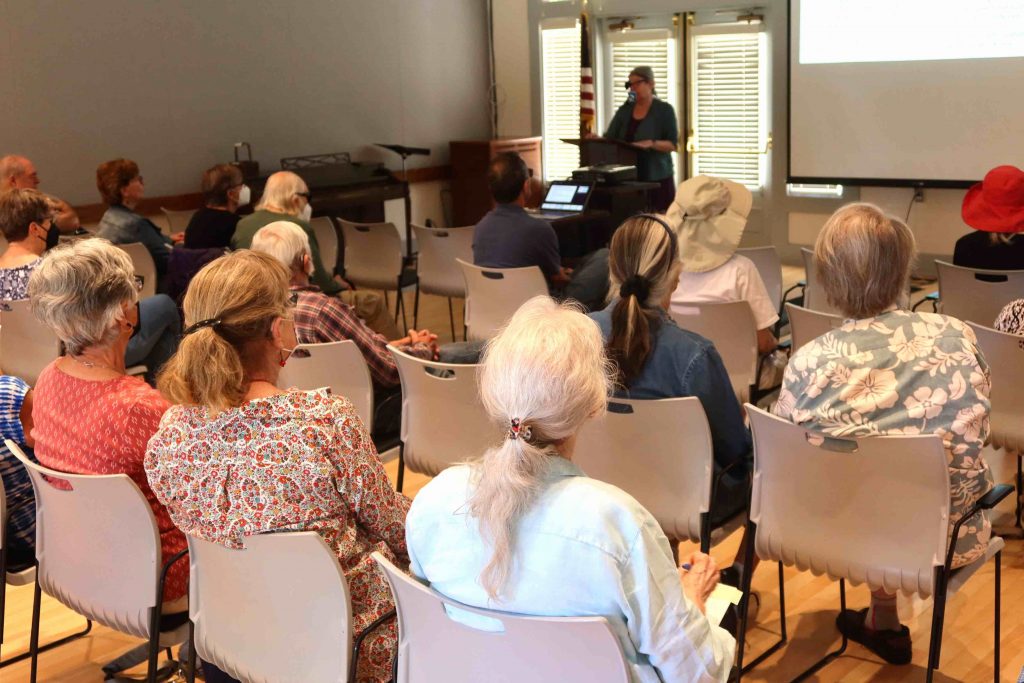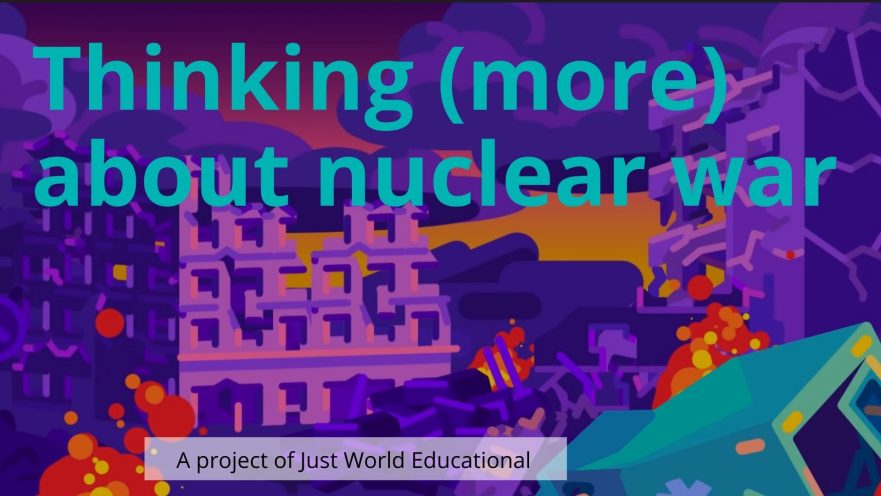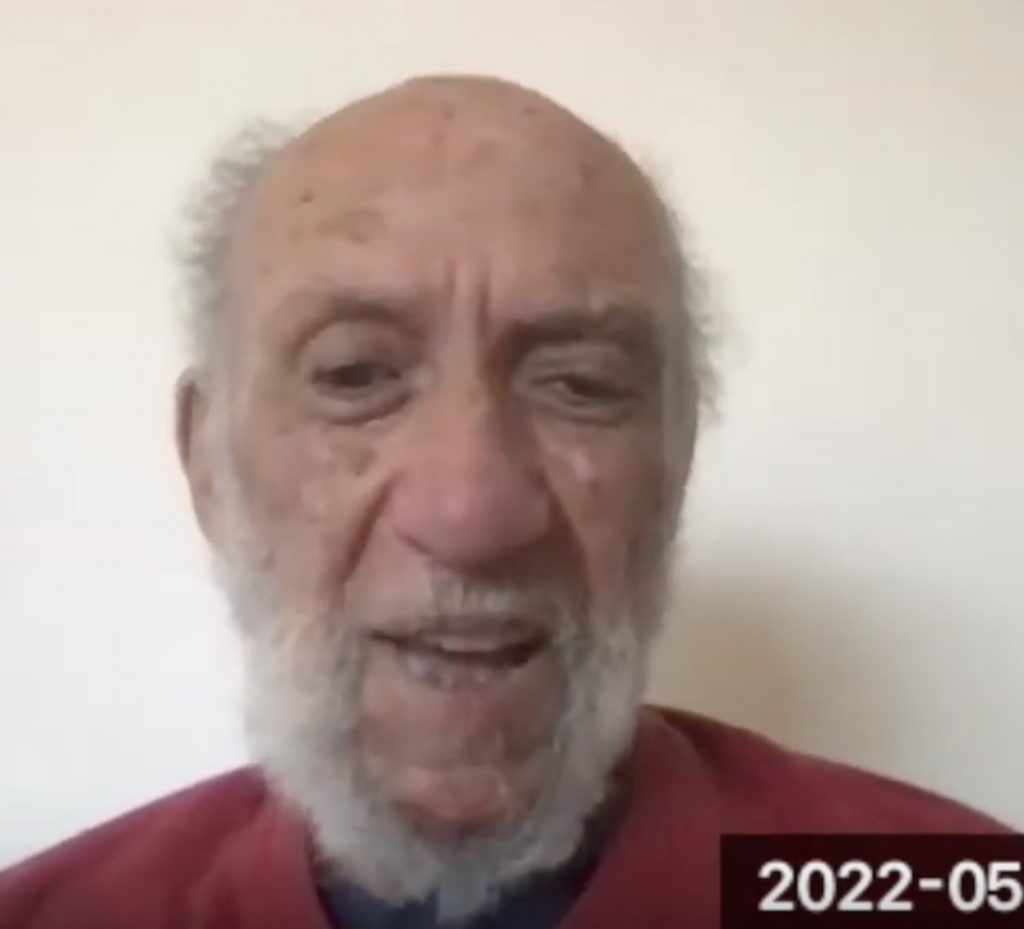In remarks delivered last week, the distinguished international jurist (and JWE board member) Richard Falk reflected on the risk of nuclear war that has been revealed by the ongoing conflict in Ukraine, during which the Russian president has made the most explicit threats of possible nuclear weapons use that the world has heard since the 1962 Cuban missile crisis.
Falk also said it is past time for the world to end the longstanding situation of “nuclear apartheid” in which a small number of the world’s states (including all five members of the UN Security Council) are allowed to have nuclear weapons while all the world’s other states are forbidden from acquiring them and harshly punished if they try to do so. And call instead for Americans and everyone else around the world to join the growing, South-led movement for the total abolition of nuclear weapons.
He also argued that the United States lost many valuable opportunities to build a much more just and sustainable world from 1990 on, after the Cold War ended with the collapse of the old Soviet Union.
These remarks were made in a 20-minute video interview, recorded with JWE President Helena Cobban, which Ms. Cobban took with her on the first speaking engagement she has taken part in since before the Covid pandemic. It was hosted by the Mount Diablo Peace and Justice Center in Walnut Creek, CA. You can see this recorded video interview here. Or if you’d like to hear a 32-minutre podcast episode that contains audio of most of the Mt. Diablo event (including the audio from the Falk video) you can catch that here.

What follow are some excerpts from a lightly edited transcript of the video interview:
HC:
Richard, we’ve heard some very lightly veiled threats from President Putin about, you know the fact that if the west crosses certain red lines, then he has extraordinary capabilities that we all know about. Does this bring to your mind a similarity with the Cuban missile crisis?
RF:
Yes. It’s a similarity though it’s veiled in greater ambiguity because it’s hard to assess whether Putin is basically bluffing or if he really feels that if these red lines are crossed, he will exercise the nuclear option because from his perspective Russian security has been put in jeopardy, or his leadership has been profoundly challenged. In the Cuban missile crisis there was that element of who would give way and the problem of not backing down in the face of a perceived threat, but the issues were very concrete and tangible; and it was clearly not just a bluff on the Russian/Soviet side and on the American side, somewhat similarly to the Russian reaction with respect to NATO and Ukraine.
This was seen as a unacceptable intrusion in our sphere of influence. And we had respected the Soviets’ sphere of influence in Eastern Europe. Otherwise world War III would’ve likely started, if we had tried to protect the Hungarian uprising in 1956 or the East German developments in ’58, and later the Czech Spring and so on. So it was very important, in at least taking steps to avoid the nuclear dangers in the Cold War period, that both the Soviet Union and the US respected traditional spheres of influence.
Now Blinken, the Secretary of State, has made very foolish comments that suggest to me a level of surprising ignorance, when he’s been quoted as saying, well, spheres of influence are a bad idea, and they should have been abandoned after World War II. If they were abandoned we probably wouldn’t be here speaking, because it’s very likely that the fragile east-west peace would’ve been shattered in the course of these kind of crises without this mutual recognition of spheres of influence. So we have a different situation now–
HC:
Right? I mean, the US obviously has a traditional sphere of influence in the whole of the Americas, under the Monroe Doctrine. And it looks as though, under the unipolar situation that existed from 1991 until last year, it looked as those successive American presidents were pushing the Monroe Doctrine worldwide making it a global thing.
RF:
Yes, a global thing, even though explicitly, as you know, the Monroe Doctrine was repudiated by American leaders and supposedly replaced by a Good Neighbor policy. But that dissipated quickly after the Cuban revolution, in which I remember hearing [Kennedy adviser] Arthur Schlesinger speak at Princeton saying that a Marxist regime was “incompatible with the values of the hemisphere”, and therefore couldn’t be tolerated. And today with the attitude toward Venezuela, Nicaragua, and Cuba, we still de facto practice Monroe Doctrine diplomacy.
And as you say, after the end of the Cold War, we assumed a kind of prerogative to be the guarantor of global security, a Monroe Doctrine for the world. And what’s happened has been that China and now Russia are challenging unipolarity on behalf of a multipolar kind of world order, which is supported largely by the people of the south. They prefer that kind of equilibrium to a unipolar dependency on us to run the world.
HC:
So after the Cuban missile crisis… there was a much more lively understanding that in order to forestall these kind of crises in the future, you need to have much better communications between the two leaderships. And in fact, you need to find ways to manage the nuclear arms race; and therefore in the decades after the Cuban missile crisis, you had this whole structure of arms control agreements. And of course the hotline between Washington and Moscow. But then with the collapse of the Cold War, which was, I have to say, very elegantly managed by first President Bush and Secretary of State Baker in order to allow– I mean, the Soviet Union was collapsing, the Warsaw Pact collapsed– but they didn’t seek to rub the noses of the Soviet/Russian leadership in their defeat.
And the fact that you could have such an intense and lively nuclear confrontation defused over the course of a couple of years without a crisis was a real triumph of diplomacy. But since then, I think Americans and people in the other NATO countries have become very lazy and disdainful of that whole concept of arms control and ramping down the nuclear arsenals and maintaining good, solid, clear communication with Moscow. So a lot of that arms control structure was dismantled and the hotline was turned off. You know, we’re in a worse situation now than the world was in the late eighties. Is that right?
RF:
I think it’s largely right, although I would dissent a little bit from your endorsement of the way the Cold War was ended. It’s true that there wasn’t a triumphalism expressed in terms of humiliating the Soviet Union further, but instead of trying to get rid of these nuclear weapons at that point– there was an opportunity that you could have had a much stronger UN, possibly eliminated the veto, and move toward a serious phased nuclear disarmament. That was a lost opportunity. Instead, the geopolitics of victory led the US to see the opportunities of unipolarity. It no longer had to worry about what Moscow thought as it was [previously] accustomed to by the constraints of a bipolar world. It felt liberated by the collapse of the Soviet Union and no geopolitical challenger in sight. And so it proceeded to establish and maintain all these hundreds of bases, foreign military bases all over the world.
HC:
And to push NATO further to the east. I mean, all of that happened under–
RF:
[Against] the advice of the most knowledgeable Soviet experts like George Kennan and Jack Matlock, our former ambassador to Moscow. And this is quickly dismissed, recently, by people who focus on this Russian aggression against Ukraine. But they do forget that these warnings were very solemnly made by the most informed American experts on the Russian security sensibility.And I think it’s not clear in retrospect that the US and the ‘West’ really won the Cold War because instead of taking the opportunities to create a safer, more humane world we created the conditions for a much more fragile world order. We suffered from what I would call geopolitical hubris and thought that we were the self-anointed leader of security everywhere and the only legitimate form of government, and a lot of delusionary ideas. And it was true for the Democratic Party leadership, as well as the Republicans. I mean, when Clinton’s doctrine of enlargement with respect to democracies was based on the idea that if more countries could become like us then there would be peace in the world. And what happened instead was this revolt against democracy. And we now have a sort of frightening trend toward populist or autocratic leaders selected by popular will, including almost having it happen here in the US…
HC:
There’s a lot of people in the younger generation who are not aware. I mean, in our webinar series [on Ukraine], we did end up with a wonderful session on the nuclear risks. But most people in the younger generation haven’t had to deal with [these nuclear risks.] Haven’t had to deal with it either intellectually or emotionally. I mean, there is definitely an emotional component to having to think about what Herman Kahn called the unthinkable, which is nuclear annihilation and the annihilation, not just of all human life on earth, but of just about all life on earth.
I mean, that is hard to think about. But if you want to really come to grips with it, you need to understand a lot about the nuclear balance, how we got where we are, you know, how the world got transformed from the US having two tiny nuclear bombs that they used in Hiroshima and Nagasaki in order to bring an end to World War II: how we got from that situation to one in which there are nine recognized nuclear weapons states, many of them in highly contentious places like India, Pakistan ,or Israel, North Korea. But at the core of it, you still have the world’s two largest nuclear arsenals, which are ours and the Russians’.
And so we are in a situation that anybody under the age of 45 has never had to deal with. Like, how do you deal with this nuclear risk? I don’t know if you have any ideas about that or ideas of what we should do to educate the next generation.
RF:
Well, I think what you were saying is the first imperative, and that is making people aware both of the historical experience of possessing these weapons of mass destruction and how essentially lucky the world was that they were never used in the period of the Cold War. I think the best book on the early nuclear diplomacy was written by Martin Sherwin who shows by examining the interaction at the Cuban missile crisis, that it was sheer luck that there was not a exchange of provocative violence that would in all likelihood have led to the use of these weapons.
And I would point out also that E.P. Thompson made the point that the country that prepares to wage nuclear war is itself walking a very treacherous moral path: to premise your own security on an announced readiness to kill tens of millions of people, innocent in every relevant way, as well as to contaminate the earth for generations to come, is something that undermines any kind of cultural moral fiber.
And I think we’ve lived with this willingness to use these weapons and to have a kind of nuclear oligarchy in the world: why some countries should have them without any restrictions. The five permanent members of the UN security council were the first five to acquire these nuclear capabilities, and the rest of the world suffers from a threat of intervention if they dare to acquire the weapons to uphold their security. For instance, Iran has a much better case to acquire nuclear weapons than the US does. It’s really jeopardized by stronger threatening neighbors. And yet it has been warned that if it should do this, it will be subject to military attack.
So there is this nuclear apartheid world system that is ingraining this kind of unequal character of the world’s structure in a way that I think is unacceptable. And therefore there was a popular movement,a movement from the Global South, which did result in the passage of a Treaty on the Prohibition of Nuclear Weapons, which came into force in 2021, I think it was, and is a challenge to the nine nuclear weapons states, none of which are among the signatories to this prohibition treaty.
So we have an issue that is very fundamental. I have always drawn a distinction between arms control, which aims to stabilize the nuclear environment and make it safer against miscalculation and accident and excess expenditures, and disarmament, which is eliminating the weapons. And the two things are not compatible. You can either work for stability or you can work for a transformed world order based on denuclearization–
HC:
Which seems today more urgent than ever. Thank you, Richard. That was great.


